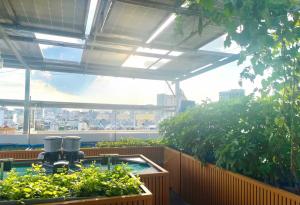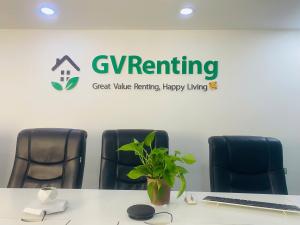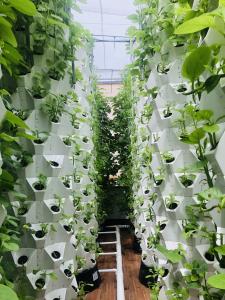GVRenting transforms Ho Chi Minh City living with rooftop farms on apartment buildings, offering tenants free, fresh veggies monthly. #GVRentingFarms
HO CHI MINH, HO CHI MINH PROVINCE, VIETNAM, September 2, 2024 /EINPresswire.com/ — In the heart of Ho Chi Minh City, where urban sprawl often leaves little room for green spaces, GVRenting, a local property management company, is redefining the scope of urban living and sustainability. Their innovative approach to property management incorporates large-scale hydroponic and aquaponic systems atop apartment buildings, turning barren rooftops into lush agricultural hubs. This integration of urban farming into residential living isn’t just a nod to sustainability—it’s a full embrace of a living, breathing model of urban agriculture that could set the stage for future developments worldwide.
A Vision for Green Urban Spaces
Founded in the early 2010s, GVRenting has established itself as a forward-thinking player in the property management sector in Vietnam’s bustling economic hub, Ho Chi Minh City. Recognizing the challenges of urbanization such as reduced greenery and the heat island effect, GVRenting sought to revolutionize apartment living by merging it with eco-friendly practices.
Their unique proposition involves converting the ample rooftop spaces of their apartment buildings into productive hydroponic and aquaponic farms. These installations are not only feats of agricultural technology but are also aesthetically pleasing spaces that contribute significantly to the quality of life for tenants.
The Hydroponic and Aquaponic Revolution
Hydroponics and aquaponics represent the pinnacle of space-efficient farming, requiring no soil and up to 90% less water than conventional farming methods. GVRenting’s systems cycle water between plant cultivation and fish tanks, where waste from the fish provides a natural fertilizer for the plants, which in turn purify the water returned to the fish. This closed-loop system not only maximizes resource efficiency but also drastically reduces the buildings’ ecological footprints.
Each month, these rooftop farms produce approximately 3-4 tons of fresh vegetables, including varieties like lettuce, herbs, tomatoes, and cucumbers, all grown organically. This bounty is distributed free of charge among the residents of the buildings, ensuring that tenants have consistent access to fresh, healthy produce directly from their own rooftops.
Impact on Community and Environment
The benefits of GVRenting’s initiative extend beyond simple produce yields. “Our goal was not just to create a sustainable business model, but to foster a community around healthy, sustainable living,” says Vuong Tri Dung, CEO of GVRenting. By involving residents in the farming process, from planting to harvest, the projects foster a sense of community and connection to the environment that is often missing in urban settings.
Environmentally, the impact is significant. The farms help to mitigate the urban heat island effect, reduce greenhouse gas emissions by cutting down food transportation, and lower the overall energy consumption of the buildings by providing additional insulation. Moreover, these green rooftops improve air quality and provide a habitat for urban wildlife, contributing to biodiversity in the city.
The Business of Urban Agriculture
The integration of farming into residential living does more than just provide free produce; it shifts the economic model of property management towards a more service-oriented approach. By offering something as innovative as an in-house source of fresh produce, GVRenting not only attracts eco-conscious tenants but also sets a new standard in the real estate market.
“Residents are not just paying for a place to live, but a way to live,” explains Thae An, a real estate analyst in Ho Chi Minh City. “GVRenting has effectively added a tangible value that goes beyond typical amenities like gyms or pools, which in turn can command a premium in the rental market.”
Challenges and Future Directions
Despite its success, the path has not been without challenges. Setting up and maintaining hydroponic and aquaponic systems requires significant technical expertise and initial capital investment. The technology, while efficient, needs constant monitoring and adjustment to maintain optimal growing conditions.
Looking to the future, GVRenting plans to expand their concept to more buildings and possibly to other cities in Vietnam. “We are exploring solar panels to power our farming operations, which would further our commitment to sustainability,” Nguyen shares about future plans.
Global Implications and Recognitions
The model pioneered by GVRenting has garnered attention from international environmental groups and urban planners alike. It serves as a replicable blueprint for integrating agriculture into urban developments globally. Their efforts align with broader global objectives like the United Nations Sustainable Development Goals, particularly those related to sustainable cities and communities, responsible consumption, and climate action.
Conclusion
GVRenting’s approach to property management and urban farming has not only proven viable but revolutionary. It challenges conventional urban development models and presents a sustainable, community-focused alternative. As cities worldwide grapple with similar challenges of space, sustainability, and quality of life, the work being done on the rooftops of Ho Chi Minh City offers a promising glimpse of urban life that harmoniously blends human habitation with nature’s bounty. In doing so, GVRenting not only changes the landscape of urban real estate but also sows the seeds for a greener, more sustainable future.
In transforming rooftops into thriving farms, GVRenting has crafted a compelling narrative of innovation and sustainability that’s ripe for emulation, illustrating vividly that in the race to the future, sometimes the best solutions come from looking upwards—toward the untapped potential above.
John Vuong
GVRenting
email us here
Visit us on social media:
Facebook
YouTube
GVRenting Vietnam News Coverage
Legal Disclaimer:
EIN Presswire provides this news content “as is” without warranty of any kind. We do not accept any responsibility or liability
for the accuracy, content, images, videos, licenses, completeness, legality, or reliability of the information contained in this
article. If you have any complaints or copyright issues related to this article, kindly contact the author above.
![]()







